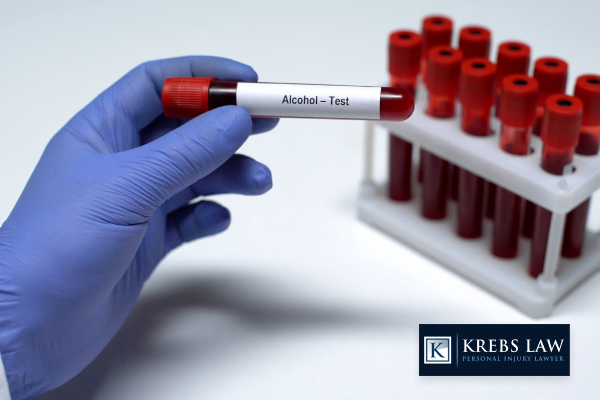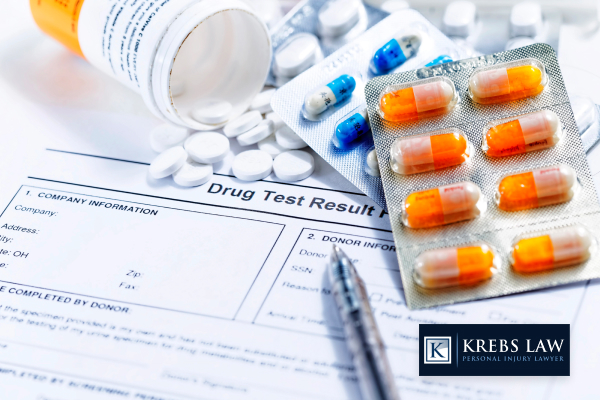This page was written, edited, reviewed & approved by JR Krebs following our comprehensive editorial guidelines. JR Krebs, the Founding Partner, has years of legal experience as a Personal Injury attorney. Our last modified date shows when this page was last reviewed.

Truck drivers carry a serious responsibility. They operate large vehicles that can cause great harm if something goes wrong. For this reason, the federal government has clear drug testing requirements in place. These rules are strict and apply to all drivers who perform safety sensitive functions for motor carriers across the country. Testing helps keep the roads safe and ensures drivers are fully alert behind the wheel.
Krebs Law Personal Injury Lawyers helps clients understand how drug testing and impaired driving affect legal claims after a crash. We have seen firsthand the dangers caused by truck drivers who use controlled substances or violate alcohol testing program rules.
Our team knows how to investigate truck accidents and determine if a company followed federal safety laws. If you're hurt in a crash involving a truck, we know how to hold motor carriers accountable. We’re here to help you get answers and protect your rights.
Federal law requires drug and alcohol testing to protect the public. It ensures that truck drivers who operate commercial motor vehicles are not under the influence while on duty. Testing helps prevent crashes, injuries, and deaths on the road.
The main goal is to stop impaired driving before it happens. Even small amounts of alcohol misuse or drug use can reduce a driver’s focus, slow reaction times, and increase the risk of deadly mistakes. Testing reduces this danger and helps motor carriers ensure drivers are fit to perform safety sensitive work.
The Federal Motor Carrier Safety Administration (FMCSA) sets national rules through the federal bankruptcy code for all interstate motor carriers and many intrastate motor carriers. These rules include drug testing program rules, clear definitions of safety sensitive functions, and strict standards for how and when tests must be done.
The FMCSA enforces a zero-tolerance policy for truck drivers using controlled substances or violating alcohol regulation limits. If a driver test positive, they must be removed from duty immediately and cannot return until completing the required return to duty process.

The Department of Transportation requires strict drug testing requirements for anyone involved in operating or managing commercial motor vehicles. These rules apply not just to drivers but also to those responsible for compliance and safety.
If you drive, hire, or manage CDL drivers in any form, you are likely required to follow federal drug and alcohol testing program rules.
All individuals who hold a CDL and operate commercial motor vehicles in the United States are required to comply with DOT drug tests and alcohol testing rules. This includes drivers performing safety sensitive functions, such as driving, loading, or inspecting trucks on public roads.
Whether working full-time or part-time, all CDL holders must meet testing standards at every stage of their employment.
Any business that hires CDL drivers for interstate motor carriers or intrastate motor carriers must enforce the drug testing program. These employers are responsible for conducting pre-employment, random drug testing, post accident drug tests, and more. Failure to follow DOT rules can result in penalties, and may impact the company’s operating authority.
Independent drivers and owner-operators are also required to follow the same drug testing requirements as large carriers. Even if they work for themselves, they must enroll in a drug and alcohol testing program, complete random drug and alcohol tests, and keep their test results up to date.
They typically work with a third-party administrator or designated employer representative to meet DOT standards.
Truck drivers and their employers must follow several types of DOT drug tests and alcohol testing procedures. Each test serves a specific purpose and happens at different stages of employment.
These tests are critical in keeping unsafe drivers off the road and making sure only qualified individuals perform safety sensitive duties involving commercial motor vehicles.
1. Random Testing: Random drug and random alcohol testing is one of the strongest tools used to prevent drug use and alcohol misuse on the job. Drivers are chosen through a computer-generated system, and testing is unannounced. Once selected, drivers must report to the testing facility immediately to ensure accurate results and deter unsafe behavior.
2. Post-Accident Testing: If a truck is involved in a serious crash, the driver may be required to take a post-accident drug test and an alcohol test. These are required when there is a fatality, a citation issued with injury, or significant property damage. Testing must be done within a strict time window and documented by the employer.
3. Reasonable Suspicion Testing: Supervisors who observe signs of alcohol misuse or drug use can order reasonable suspicion testing. This decision must be based on specific, observable behavior, such as slurred speech, erratic movements, or the smell of alcohol or drugs. Employers must ensure their managers are properly trained to make these calls in compliance with DOT regulations.
4. Return-to-Duty and Follow-Up Testing: If a driver tests positive or violates DOT rules, they must complete a full return to duty process before working again. After passing an initial return to duty test, the driver is placed into a follow-up testing program. This includes several unannounced tests over a period of time, ensuring the driver remains clean and compliant.
5. Pre-Employment Testing: Before any CDL driver can begin performing safety sensitive functions, they must pass a pre-employment drug test. This test is required even if the driver has worked in the industry before or recently completed a test elsewhere. Employers cannot allow new drivers to start working without a negative test result on file.

DOT drug screens test for a specific group of controlled substances known to impair a driver’s ability to safely operate a truck. These substances are detected using urine specimens and analyzed by laboratories certified by the Department of Health and Human Services. All drug test results must be reviewed by medical review officers for accuracy.
These substances are part of every DOT-regulated drug testing program and must be tested any time dot drug tests are conducted, including pre-employment, random drug testing, or post accident drug test situations.
In addition to DOT drug tests, drivers must also comply with federal alcohol testing program rules. These tests help detect any alcohol misuse before it puts others at risk. The testing process is quick, reliable, and designed to catch violations early. CDL drivers are held to a stricter standard than the general public due to the nature of their work.
Drivers are tested using either a breathalyzer or a saliva-based device, both approved under federal alcohol regulation standards. These tools are used during random alcohol testing, post-accident testing, or reasonable suspicion scenarios to check for recent drinking.
Under DOT rules, the legal limit for CDL drivers is a BAC of 0.02. While non-commercial drivers may legally drive with up to 0.08, commercial drivers must meet this lower standard when performing safety sensitive functions.

When a truck driver fails a DOT drug test or an alcohol test, serious steps must follow. These rules protect other drivers on the road. The driver cannot return to work until they complete a special process. The steps below explain what happens next in a simple and clear way.
If a driver tests positive for drug use or alcohol misuse, they must stop working right away. They are not allowed to drive or do any job that affects safety. This rule helps prevent more danger and keeps the roads safe for everyone.
The driver must meet with a trained expert called a substance abuse professional. This person looks at the driver’s case and decides what kind of help they need. It could be education, treatment, or both, depending on the problem.
Before the driver can go back to work, they must finish the full return to duty process. This includes following the expert’s plan and passing a final drug or alcohol test. After they return, they may also face more tests for several months to make sure they stay clean and safe.
Trucking companies and other employers who hire CDL drivers must follow special DOT rules. These rules are made to keep the public safe and make sure drivers stay drug- and alcohol-free. Employers must take clear steps to follow the law and protect everyone on the road.
Every employer must create a written policy that explains their drug testing program and alcohol testing program. This paper must clearly say when tests happen, what drivers can expect, and what happens if someone tests positive. All drivers should be given a copy before they start work.
Employers must keep detailed records of all drug test results, training, and reports. These records help show that the company is following the law. If the United States Bankruptcy Court, FMCSA, or other groups ask to see them, the company must be ready.
Supervisors must be trained to spot signs of drug use or alcohol misuse. This training helps them know when to order a reasonable suspicion test. It must include clear examples and help supervisors act quickly and correctly when they notice something wrong.
1. Who must undergo testing under DOT regulations?
All public roads CDL drivers who perform safety sensitive jobs must undergo testing for drugs and alcohol. This includes full-time, part-time, and temporary drivers. Employers employing CDL drivers must also make sure these workers complete all required tests as outlined by DOT rules.
2. What is the drug and alcohol clearinghouse?
The drug and alcohol clearinghouse is a secure online database that stores alcohol testing information and drug test results. It tracks whether a driver has had a verified positive, refused to test, or completed the return to duty process. Employers, persons designated, and enforcement agencies can check the clearinghouse before hiring a driver.
3. What happens if a driver gives a substituted test result?
A substituted test result means the sample given was not valid, possibly because the person tried to cheat the test. This is treated as a failed test under DOT rules and is reported to the drug and alcohol clearinghouse. It has the same consequences as a positive result.
4. Can controlled substance use ever be allowed for CDL drivers?
Controlled substance use is only allowed if the drug is legally prescribed and the driver’s doctor says it’s safe to use while driving. Even then, the driver must tell the employer, and the medical review officer must confirm the drug won’t affect safety.
5. Who can access a driver’s test records?
Only certain persons designated (such as employers, law enforcement, and licensing agencies) can view a driver’s test results in the secure online database. The driver must give permission for most employers to access their records unless it's for safety enforcement.

If you or a loved one was injured in a crash involving a commercial truck, and you suspect controlled substance use or alcohol misuse played a role, Krebs Law Personal Injury Lawyers is here to help. We understand the strict rules that apply to employing CDL drivers, and we know how to uncover violations of drug testing and alcohol testing laws.
Our team will examine the drug and alcohol clearinghouse, look at test results, and check if the trucking company followed all required tests. We fight to hold unsafe drivers and their employers accountable. Whether the driver gave a verified positive result, a substituted test result, or failed to complete the return to duty process, we make sure your case is built on strong evidence.
Contact us today to schedule your free consultation with an experienced Montgomery DUI lawyer. Let us answer your questions and help you pursue justice and fair compensation.

J.R. is dedicated to providing personalized representation, avoiding a one-size-fits-all approach. He tailors his strategy to the unique challenges and needs of each client and case, ensuring focused and individualized attention.
His practice mainly covers Plaintiff’s Personal Injury, including car and 18-wheeler accidents, slips and falls, dog bites, defective products, and wrongful death. He also handles commercial disputes on contingency, with experience in contracts, construction, and probate. For any dispute headed toward litigation, J.R. develops an aggressive strategy to maximize your recovery through negotiation, arbitration, or trial.


"*" indicates required fields

"*" indicates required fields